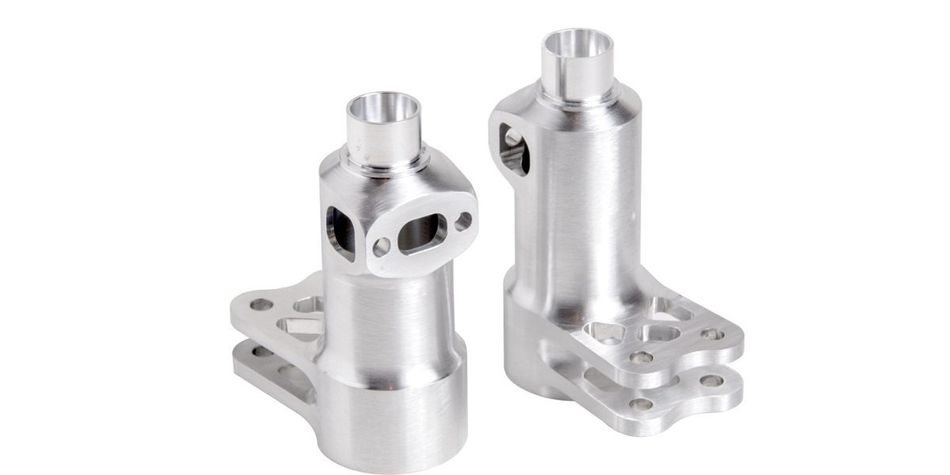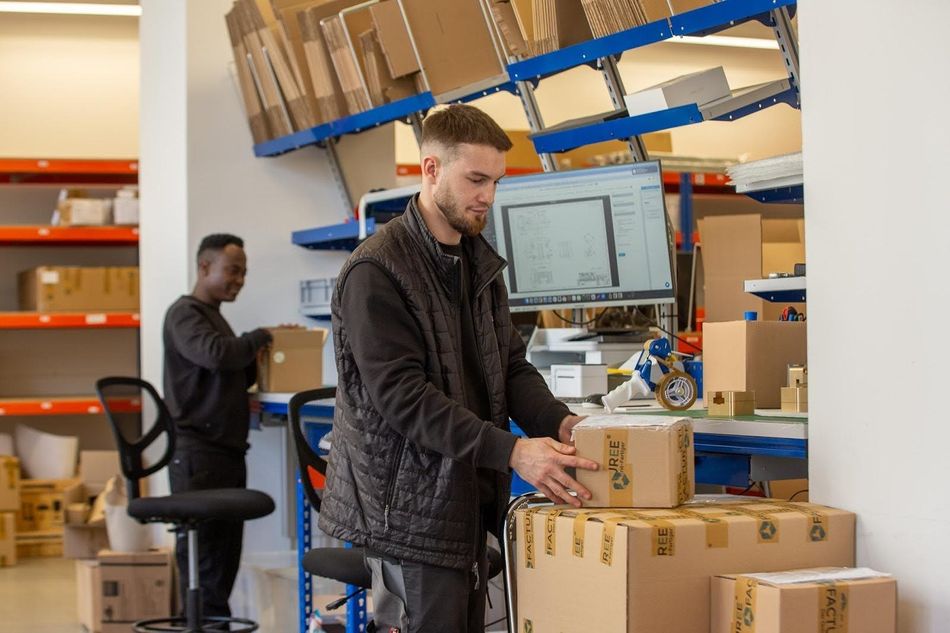Custom Parts, Global Solutions Moritz Konig Unpacks FACTUREEs Data-Driven Approach
Explore how FACTUREE, led by CEO Moritz Knig, transforms the custom parts industry with advanced AI-driven solutions. Dive into the discussion on challenges, innovations, and the future of manufacturing as Knig details the companys unique approach to procurement and production.
The procurement of custom parts has long been a complex and time-consuming process, often defined by unpredictable costs and fragmented supplier networks. FACTUREE, founded by engineer and entrepreneur Moritz König, aims to change that. By applying artificial intelligence and data-driven decision-making to the sourcing of custom components, the company offers a fresh perspective on how manufacturing can adapt to modern challenges. In this conversation, König reflects on the origins of FACTUREE, the limitations of traditional costing methods, and how digital tools are reshaping procurement and supply chain strategies in an increasingly uncertain world.
Jessica Miley: Moritz, let's start with your introduction and background.
Moritz König: My name is Moritz König, and I'm the CEO and founder of FACTUREE. My background is in engineering and economics. While I was studying, I actually fell in love with engineering far more than economics, which is funny considering I now lean more towards the economics side of things. I was always certain I wouldn’t end up in a big company. After university, I worked for different startups, starting as a CTO for a small startup and then moving on to become a lead design engineer for a larger one. During my time at this specific company, I was frequently involved in purchasing custom parts. Despite the company's size, we lacked a proper purchasing department, so I handled it myself. I remember contacting suppliers, facing rejections, and navigating through high costs until a friend recommended a company that delivered what I needed quickly and at a fraction of the cost. That experience opened my eyes to the inefficiencies in the market.

Jessica Miley: What is FACTUREE and why is should-costing for custom parts fundamentally flawed?
Moritz König: FACTUREE deals with the procurement of custom parts, which are unique and tailored for specific applications—be it for an airplane, a bicycle, or even an iPhone. Since these parts are custom-made, there's no standard catalog you can refer to for pricing, which makes traditional should-costing methods ineffective. A slight modification in design can significantly alter the cost and manufacturability. Our approach uses AI to estimate costs more accurately by predicting what each supplier in our network might charge, reflecting the vast price differences that can exist for seemingly similar parts.
Jessica Miley: So, Moritz, could you explain more about FACTUREE's operations and why traditional costing methods are not suitable for custom parts procurement?
Moritz König: Certainly. Custom parts are unique to each application, whether it’s for an airplane, a bike, or a smartphone. These parts aren’t found in any catalog; they are designed from scratch, often for a single use. This uniqueness means you can't easily compare prices or features like you would with standard parts. The slightest change in a design—a hole, a chamfer, a surface treatment—can drastically change the cost and manufacturability. Suppliers must then estimate how well they can manufacture these parts without prior experience, which introduces a lot of unpredictability into pricing. Our industry is like chaos theory in action—predicting costs is as uncertain as forecasting the stock market.
Jessica Miley: How does FACTUREE's AI-driven best costing approach address these challenges?
Moritz König: We developed a system that simulates asking every possible supplier for their best price, creating a software that predicts costs across our network. This is crucial because each supplier might set a different price for the same job based on their capabilities and current workload. It took us about six years to refine this software, reducing our supplier base from 100,000 to 2,000 and focusing on collecting over 600,000 data points per supplier to enhance our predictions. This massive data collection effort has been integral to our ability to offer competitive and fair pricing to our clients.
Jessica Miley: And how does this approach help with supply chain resilience, especially given recent global disruptions?
Moritz König: Our platform helps diversify production risks by spreading them across 2,000 production sites worldwide. By acting as a single supplier interface but leveraging a global network, we can quickly shift production among sites in response to local disruptions, tariffs, or other challenges. This flexibility helps our clients maintain steady supply chains even in volatile market conditions.

Jessica Miley: What are the broader strategic benefits of digital procurement?
Moritz König: Digital procurement simplifies the sourcing process for custom parts. It mitigates the need for our clients to engage with numerous suppliers individually, handling all the complexities of international procurement and compliance. During the COVID-19 pandemic, for instance, our method proved invaluable as we could maintain supply chains that traditional methods couldn't support due to global disruptions.
Jessica Miley: Can you elaborate on the other savings that companies achieve by using your services instead of managing procurement themselves?
Moritz König: Yes, one of the primary benefits is the significant time savings. Working with us is much easier than managing a large pool of suppliers independently. I recently spoke with a client at a fair in Mannheim who mentioned that their company, which generates about $ 100 million in revenue and spends around five million on custom parts, had accumulated a thousand suppliers over the years. This accumulation occurred because each supplier would often provide different and inconsistent information at the outset, saying tasks were impossible or quoting unreasonable prices. They were struggling to manage this vast supplier network with just three staff members in their purchasing department. This example illustrates how we simplify the procurement process, making it far more manageable and time-efficient for our clients.
Jessica Miley: With the introduction of the Carbon Border Adjustment Mechanism (CBAM) posing new challenges for many companies, could you explain how FACTUREE's platform helps customers navigate and comply with these regulations without additional burdens?
Moritz König: With CBAM, compliance becomes seamless for our clients when they source through us. It’s as if they are sourcing within the EU, which simplifies compliance significantly. We manage a substantial portion of our sourcing within the EU, but we also handle procurement globally. Our controlled processes allow us to optimize sourcing strategies for maximum client benefit. For instance, if a client needs a part that is best manufactured in Germany, we source it there, but if another part type is more efficiently produced in Taiwan, we'll manage that too.
This flexibility ensures compliance with international regulations like CBAM without placing extra burdens on our clients. Essentially, we streamline everything to make sourcing straightforward and compliant for our clients.
The Carbon Border Adjustment Mechanism (CBAM) is a policy introduced by the European Union to address carbon leakage and promote global emissions reductions. It imposes a carbon price on imports of certain carbon-intensive goods, such as steel, cement, aluminium, fertilizers, electricity, and hydrogen, aligning the carbon costs of imported products with those produced within the EU. For companies, CBAM introduces new compliance requirements, including detailed emissions reporting and potential cost increases for importing carbon-intensive materials. |
Jessica Miley: I've heard that many of your customers are initially surprised to learn about the full range of manufacturing processes that FACTUREE supports. Could you discuss a little bit about your approach to supporting customers from design to production?
Moritz König: While we typically do not provide support during the initial design phase in our standard services, our business engagement begins once the client has definitive drawings and knows exactly what they want. However, we do have a key account team capable of participating in the design process, particularly with considerations for manufacturability—though this is more of an exception than the rule.
Once the client is ready with specifications, our work begins in earnest. What truly distinguishes us is our capability to handle nearly every manufacturing method from the get-go. Our aim has always been to simplify the procurement of custom parts, no matter the complexity or size of the project. We currently offer an extensive range of processes, including milling, turning, sheet metal working, welding, forging, sand casting, investment casting, injection molding, and various forms of 3D printing like FBM, SLS, SLA, and SLM. Essentially, if it can be manufactured, our goal is to be capable of doing it.
Additionally, our approach to materials is just as comprehensive. Whenever we encounter a new material requested by a client, we add it to our portfolio—even if it means initially declining the project due to the unavailability of a suitable supplier at that moment. This prompts us to continuously update and qualify our suppliers to accommodate the new material. We’re constantly expanding our material capabilities, which often surprises new clients due to the breadth of our adaptability and resourcefulness.

Jessica Miley: Looking ahead, which future developments in industrial procurement should companies already consider today to remain competitive?
Moritz König: That's a challenging question because the situation is incredibly fluid and complex, with many crises happening simultaneously. So, there's a chance that whatever I say could be outdated quickly. However, pressing on the subject, one constant is the significant impact of digital transformation. It's surprising that even in Germany, where we're known for engineering excellence, many large companies still operate with outdated technologies as if it were the 1990s. At FACTUREE, we embrace digital integration; every request, even those as simple as an email, is fully integrated into our system. This seamless digital integration highlights that despite the advancements, Germany still has substantial room for improvement in fully adopting modern digital practices.
Another critical area is data-driven decision-making. We've been focusing on this for over seven years, yet it feels like we're still just beginning. People are naturally skilled at making decisions based on intuition, which can be effective in the absence of data. But when data is available, it should be utilized to its full potential, enhancing decision-making processes significantly.
Lastly, the topic of supply chain resilience is more relevant than ever. I remain optimistic and hope for stability and a return to normalcy, yet it’s crucial for companies to proactively address any underlying vulnerabilities in their supply chains that should have been managed long ago. Now is the time to act and strengthen these areas before facing potential disruptions.
Discover the future of custom parts at FACTUREE.

